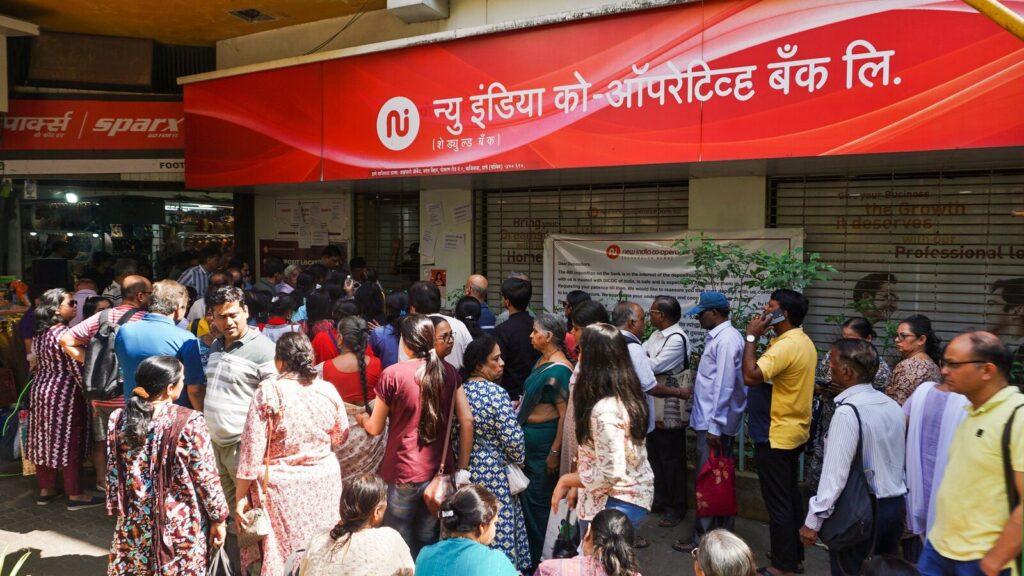New India Co-operative Bank fraud case: The Reserve Bank of India (RBI) superseded the Maharashtra-based New India Co-operative Bank board for 12 months after imposing several financial and service restrictions due to irregularities in its lending practices. The Mumbai Police unearthed a ₹122 crore-worth financial fraud committed by the lender’s former general manager (GM), Hitesh Mehta, who the Economic Offences Wing arrested.
The ex-GM was questioned for over three hours on February 15, and his statement was recorded before the probe agency concerning the case registered against him and others. Mehta will be produced before a local court on Sunday. The RBI, along with superseding the cooperative bank’s board, appointed an administrator to manage its ongoing affairs.
Also Read: New India Co-operative Bank fraud: Mumbai Police arrests ex-GM for siphoning ₹122 crore amid RBI curbs
RBI order against New India Co-operative Bank Ltd
In its instructions against the bank, the RBI said,”It is hereby notified for information of the public that the RBI has issued certain Directions to New India Co-operative Bank Limited, Mumbai (“the bank”), whereby, as from the close of business on February 13, 2025, the bank shall not, without prior approval of RBI in writing, grant or renew any loans and advances.”
According to RBI’s order, account holders cannot make any investment, incur any liability, including borrower of funds and acceptance of fresh deposits, disburse or agree to disburse any payment whether in the discharge of its liabilities and obligations or otherwise, enter into any compromise or arrangement and sell, transfer or otherwise dispose of any of its properties or assets except as notified in the RBI Direction dated February 13.
Also Read: RBI supersedes New India Co-operative Bank board for 12 months after imposing restrictions over lending irregularities
“Considering the bank’s present liquidity position, the Bank has been directed not to allow withdrawal of any amount from savings bank or current accounts or any other account of a depositor but is allowed to set off loans against deposits subject to the conditions stated in the RBI Directions.”
“These directions are necessitated due to supervisory concerns emanating from the recent material developments in the bank and to protect the interest of depositors,” said the central bank in its order against the lender.
Hence, the RBI prohibited the bank from issuing new loans, suspended deposit withdrawals, and superseded the bank’s board for mismanagement. However, the lender can set off loans against deposits subject to the conditions stated in the RBI directions. It may also incur expenditures on certain essential items such as employee salaries, rent, and electricity bills.
Also Read: Relief for Kotak Bank: RBI lifts bar on onboarding credit card, online customers
How will the RBI crackdown impact account holders and depositors?
1.No cash withdrawal from savings, current, and other bank accounts
The RBI issued a notice to halt all business at the bank in Maharashtra, barring it from carrying out financial operations without prior approval. The RBI has barred account holders and depositors from withdrawing money from the lender via bank branches or ATMs for six months.
According to RBI’s order, account holders cannot make any investment, incur any liability, including borrower of funds and acceptance of fresh deposits, disburse or agree to disburse any payment whether in the discharge of its liabilities and obligations or otherwise, enter into any compromise or arrangement and sell, transfer or otherwise dispose of any of its properties or assets except as notified in the RBI Direction dated February 13.
2.Depositors can claim up to ₹5 lakh through insurance
The central bank, in its notice, further directed that depositors would be entitled to receive deposit insurance claim amount of their deposits up to a monetary ceiling of ₹5,00,000 in the same capacity and the same right from the Deposit Insurance and Credit Guarantee Corporation (DICGC).
The RBI, however, gave relaxation to the New India Co-operative Bank in respect of certain essential items such as salaries of employees, rent, electricity bills, etc. “These directions are necessitated due to supervisory concerns emanating from the recent material developments in the bank and to protect the interest of depositors,” said the central bank in its notice.
3.Depositors to track claims online
According to reports, 90 per cent of the 1.3 lakh depositors will get their entire deposits back, as up to ₹5 lakh is covered under deposit insurance from the Deposit Insurance and Credit Guarantee Corporation (DICGC), as applicable under the provisions of the DICGC Act, 1961, based on submission of willingness by the depositors concerned and after due verification.
Also Read: RBI cancels March 31 bank holiday: PSBs, private banks to stay open for fiscal-end closures
Depositors have been advised to contact the bank officials for further information; details can be accessed on the DICGC website. However, several customers claimed that they have not received any communication from the bank on when they will be able to access their bank accounts.
“The bank will continue to undertake banking business subject to restrictions specified in the said Directions till its financial position improves. The RBI continues to monitor the bank’s position and will take necessary actions, including modifications of Directions, as warranted, depending upon circumstances and in the interest of the depositors,” it said. The RBI added that the directions on the bank will remain in force for six months from the close of business on February 13, and the bank’s activities will be reviewed.
Catch all the Industry News, Banking News and Updates on Live Mint. Download The Mint News App to get Daily Market Updates.
MoreLess
Source:https://www.livemint.com/industry/banking/new-india-co-operative-bank-fraud-how-will-the-rbi-crackdown-mumbai-police-case-impact-account-holders-depositers-11739632791479.html

